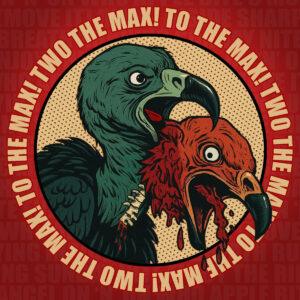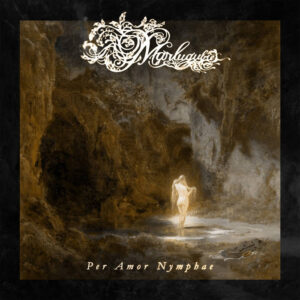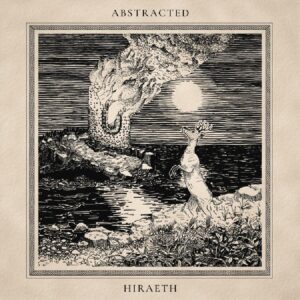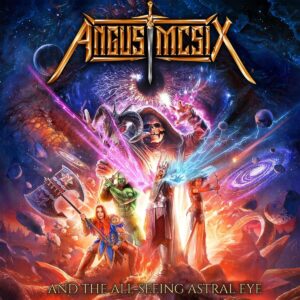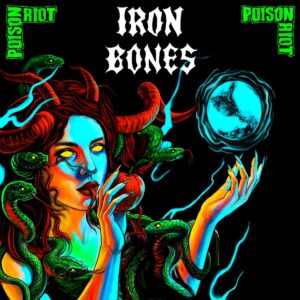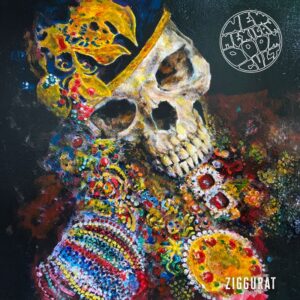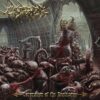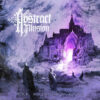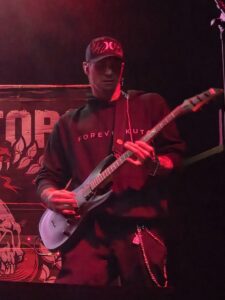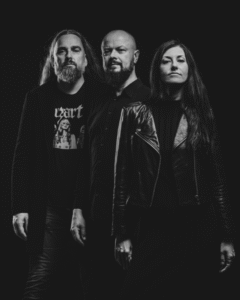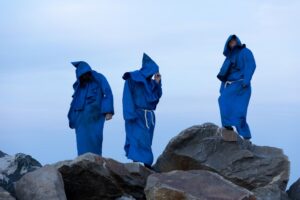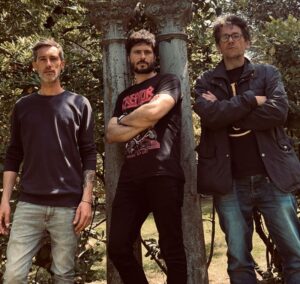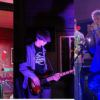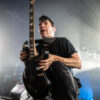Jeffrey Revet & Jouke Westerhof
Redstacks
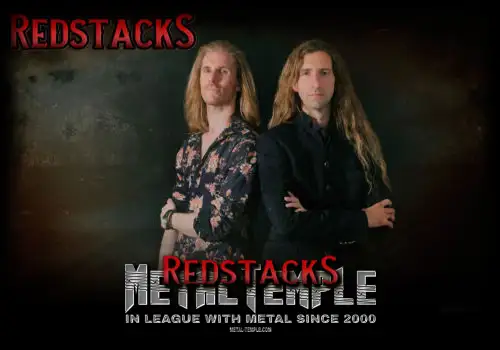
J.R.: We're doing fine, crazy times with all the Covid restrictions still. But a lot of positive vibes because of the release of our album. Thanks for having us.
J.W.: At first, back in 2018, we just started working on instrumental ideas because we both share the love for rock of the 70s and 80s. We were touring the Dutch theatres with a production playing Queen music and we felt like making music of our own instead of only covering songs. Rather quickly we had a couple of ideas laying around and reached the point of no return, so we reached out to fellow musicians to share our ideas with.
We got great response: found a killer rhythm section – Tim Beudel on drums and Rob van der Loo on bass – and got response from 7 vocalists who wanted to sing (Paul Adrian Villarreal, Martin van der Starre, Jan Willem Ketelaers, Nick Holleman, Timothy Drake, Laura Guldemond and Thomas Meeuwis). So, things got serious. We recorded all the basic tracks old school style, all instruments together in the same live room (at the great Sandlane Recording Facility) to keep the vintage vibe. Later we recorded additional instrumental parts (solo's, some overdubs) and all the vocals in Jeffrey's studio.
Flash forward to 2022, this is far more than a project, we can call it a band now, with Marcel Berveling on bass and Jan Willem Ketelaers as the main vocalist. This will certainly not be the last thing you'll hear from us. So, behold, haha.
J.R.: Although we were born a little later, in the 80s, we musically grew up with the rock music from the 70s. That era produced a lot of inspiring music that is interesting form a composition point of view and that is instrumentally very challenging to play. Some of the bands from the 70s that still tour today are still on the top of their game. To us that's very inspirational.
J.W.: We don't try to re-invent the wheel. I think the raw vintage vibe on recordings is becoming more and more rare these days. We didn't want to sound heavily produced, but since we don't record on the really old equipment (except for tube powered guitar amps and Hammond organs of course) and have the availability of modern DAWs I think it's a bit 'best of both worlds' if we can say that.
Most important for me personally is that I feel a connection with my guitar sound (I think every musician tries to accomplish that) but what I mean is this: if dialled in just right, and I play a simple but badass riff or a few chords, I feel like f!@# yeah, that's what it's about. Having fun while trying to play cool stuff with a hint of that music I grew up with. Long answer short(er), we try to bring the joy of the old rock days back. No boundaries, if it sounds right to us, why not do it? Just try to make music we enjoy and hopefully a lot of you do too, without trying to fit into a certain frame or think too much about if it will be hip or not. I hope the rest agrees with me, but I see this as my musical playground.
J.R.: We'd like to keep the interpretation of that title a little open. Of course, it's a wink to our homage to the classic rock sound. But it also hints to the feeling we had during the Covid lockdowns. Part of the album was produced during the pandemic. We saw a lot of colleague musicians with doubts about their future. So, it's also a positive thought from our side to keep working on something and come out stronger.
J.W.: Actually, most of the lyrics were written before the pandemic. On the last song, Angels in Crime, there were some edits being made but the main lyrics were already done. That particular song is about concerning stuff going on in the world right now and has an even deeper meaning during these times. But most of the writing process started with just a musical vibe that Jeffrey and I created. In most cases we gave the vocalists the freedom to write their own lyrics on these ideas.
J.R.: Working with 7 singers is just a result of how we started Redstacks. Jouke and I started of writing music with the two of us just for fun. The decision to record an album was made when we already had 5 instrumental songs ready. We really took it step by step. We contacted some vocalists within our network, but we also did a call on Facebook. From the response we got we selected the vocalists that we thought should fit our music and we asked them what song they personally felt best to work on. So maybe "natural selection" is another well-known phrase we can use here. J
We continued songwriting with these people and ended up with 7 singers on the album.
Same goes for the recording line-up. We contacted Tim Beudel and Rob van der Loo because we knew they liked this music, and they would do a great job for the recordings. At the time of writing this interview we're already a step further and preparing for our live shows. For that we do want Redstacks to be a full band with a permanent line-up. It was clear that Rob would be too busy with Epica to be part of it. So, we found a great bass player, Marcel Berveling, to replace Rob in the permanent line-up. Drummer Tim Beudel is still part of it. Of course, bringing 7 singers on stage every time is not doable as well. Luckily Jan Willem Ketelaers offered us to rehearse the full album, so he' going to be our main singer for the live shows. But that doesn't mean there won't be any guest appearances anymore. The other singers did a great job as well and we strongly believe this helped to make the album what it is.
J.W.: Besides the fun we had, I learned a lot. The first demos we wrote together started mostly from small musical ideas: a riff or chord progression Jeffrey or I came up with. In the very beginning of this process, we would put a lot of pieces in a song to fill it up. When we got further in the process and knew we would record an album, we left more room for the vocals and thought more about the concept of the songs.
Songwriting wise: I like to write on ideas with someone else. If I bring a basic chord progression or a riff and have a certain idea in my head of what has to come next, Jeffrey has another idea which can be really interesting. A lot of my basic ideas I brought to our writing sessions turned out different than I eventually thought, and probably vice versa too. That's what I like about this workflow: you bring both of your good ideas to the table and a song comes out. Also, recording the basic tracks all together in the same room, that was new to me since I was used to recording one instrument at a time. You really have to focus even more and try to not screw up the take because it may be someone else's best.
Sound wise, I think almost every guitarist will agree, I'm always searching for a better sound. So, my signal chain from guitar to amp and everything in between evolved a bit since the recording of this album. It's not night and day difference, but I think on following albums my guitars will sound just a bit more like the sound I've got in my head. Time (and the new records) will tell…
J.R.: We started every writing session with an empty canvas. No plans, just working on what comes up on the spot. This will always be influenced by your mood on that point. The very first song we wrote was the "Overture 1848". It's based on a riff that Jouke came up with. And we did want to settle what Redstacks would be, so it contains a lot of musical ingredients for the rest of the album.
A melangolic idea like Vortex must have come up on a dark evening behind my organ. And I'm pretty sure we wrote the funky basis for Dystopia Now on a bright summer's day.
But we also kept the dynamics of the complete album in mind. So for the second half of the album, we started thinking more specific about the vibe a songs that we needed extra on the album.
J.W.: I think the most obvious challenges are the unusual workflow of first writing instrumental ideas and then putting vocals on these tracks that work. Also working with 7 different vocalists can be challenging, planning wise but also live. Fortunately, it worked out pretty well and Jan Willem Ketelaers, who also sang on 3 tracks, learned all the other parts as well so will be our main vocalist. Jeffrey and I started out with just the two of us, we had to find musicians that would play with us. I think follow up albums will be easier to create since we're now a band and can share ideas much faster and earlier in the writing process.
J.R.: We had all the instrumentals written before we did send them to the vocalist. From that point they started writing melodies and lyrics. In most cases we went back and forth a couple of times. Making adjustments in not only the vocal lines, but the song structures as well. Because we had the vocalists choose what songs to work on, we have some songs that contain input from several vocalists.
J.W.: The rock scene in the Netherlands isn't as big as in many other countries so we knew rather quickly who we wanted to approach. Also, since Jeffrey played for 10 years with Stream of Passion, he knew many rock vocalists already from the scene. We had some ideas who we liked to hear on certain tracks, but some suggested other songs that turned out really well. It was an interesting process, that's for sure.
J.R.: Nick is a great person to work with! I knew him because we did a tour with rock opera The War Of The Worlds together. He has such a lot of energy, and his vocal range is amazing. On the other hand, we didn't want his performance to sound "too metal" for this album. So mainly on a song like Mercy we really asked him to hold back a bit to get a more warm and bluesy sound.
J.W.: The way we recorded the album was really interesting and fun. We learned a lot from all the input we got. I think for now we will focus more on working with a main singer – Jan Willem, so we can also write songs that will fit his voice best. But who knows, if a certain song asks for a certain sound we can always see if we ask another vocalist.
J.W.: Personally, I love albums that provide a balance between rock n roll and moodier / melancholic vibes. When we came up with the idea for Vortex, I felt this song could help to get a bit of that balance on the Redstacks album. Jan Willem
Ketelaers came up with toplines and backing vocals that really lifted the song. And we askes a befriended songwriter, Lise Low from Isle, to write the lyrics. She has a background in Dreampop, and conceptual music and it all added up to the vibe of this song.
We had some discussion about doing the instrumental middle part or not. But I felt a little instrumental exposure of our prog-rock background wouldn't do any harm. As long as it suits the story that's been told within the song.
J.W.: Thanks a lot for the kind words! We wanted to write a heavier tune with a touch of metal, to close the album with a bang. Jeffrey came up with the basic chorus chords, and while jamming around during a writing session the song almost wrote itself. We wanted to put in some breaks and solos from the both of us. The lyrics written by Marjon Revet-Weerink and Thomas Meeuwis fit the vibe of the song really well. It's about stuff we're all concerned about. I really like playing it!
J.R.: Sure, there is. We absolutely don't see Redstacks as a onetime project. We hope to establish an album making band for decades to come. Also, in the tradition of our musical inspirations. First songs have already been written.
J.W.: Thanks for having us, let's keep classic rock relevant, cheers!
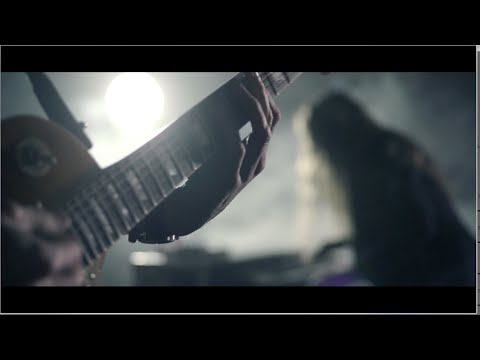
More results...

